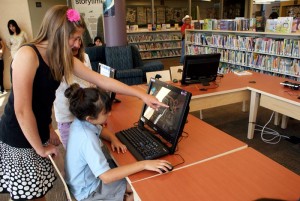 Internet Safety:
Internet Safety:
For internet safety we recommend having a look at Common Sense Media’s Internet Safety Library.
Below are some basic safety tips for Elementary School Kids to follow:
- Never share their names, schools, ages, phone numbers, or addresses;
- Never send pictures to strangers;
- Keep passwords private (except to parents);
- Never open email from strangers – it may contain viruses that can harm a computer; and
- Immediately tell an adult if something mean or creepy happens.
Information retrieved from Common Sense Media
For more detailed information about internet usage and safety at all of the city of Santa Clarita Public Libraries, please have a look at our Internet Use Policy.
Below are some more Online Safety and Safe Searching Links:
Safe Kids
This is a good site for kids that includes safety advice tools, an online safety quiz, and a child safe search.
Cyber Safety
This is an interactive guide to staying safe on the Internet.
Criteria for Choosing Apps or Book Apps for Upper Elementary Schoolers
Instead of having your elementary schoolers play with apps or book apps it is better for this age group to have them start learning to build their own apps or make their own stories through electronic means. Apps and book apps can still be used as a supplement to print or specific ideas and the criteria for choosing apps and book apps are the same as the younger elementary kids.
Below are some exciting ways to get your elementary schoolers involved in coding or building:
Scratch
With Scratch, you can program your own interactive stories, games, and animations — and share your creations with others in the online community. Scratch helps young people learn to think creatively, reason systematically, and work collaboratively — essential skills for life in the 21st century. Scratch is a project of the Lifelong Kindergarten Group at the MIT Media Lab. It is provided free of charge.
Mozilla Webmaker
Webmaker is a Mozilla project dedicated to helping you create something amazing on the web. Their tools and teaching guides allow webmakers to not only create the content that makes the web great, but — perhaps more importantly — understand how the web works. With this knowledge, we can make a web without limits. That’s the philosophy behind webmaker.org. We’ve built everything so you can see how it works, take it apart and remix it.
Code
Code.org® is a non-profit dedicated to expanding participation in computer science education by making it available in more schools, and increasing participation by women and underrepresented students of color. Their vision is that every student in every school should have the opportunity to learn computer programming. They believe computer science should be part of the core curriculum in education, alongside other science, technology, engineering, and mathematics (STEM) courses, such as biology, physics, chemistry and algebra.
Code Monster
Crunchzilla builds educational games. Code Monster is an interactive tutorial using live code where kids ages 9-14 (and for curious adults) can play with code, experiment, build, and learn. Players learn step-by-step building fun graphics, animations, and even fractals and simple games. Players build right away with code, learning about coding by coding.
Khan Academy
Khan Academy is an organization on a mission. They are a not-for-profit with the goal of changing education for the better by providing a free world-class education for anyone anywhere. All of the site’s resources are available to anyone. It doesn’t matter if you are a student, teacher, home-schooler, principal, adult returning to the classroom after 20 years, or a friendly alien just trying to get a leg up in earthly biology. Khan Academy’s materials and resources are available to you completely free of charge.
Khan Academy has a computer programming section here: https://www.khanacademy.org/cs





